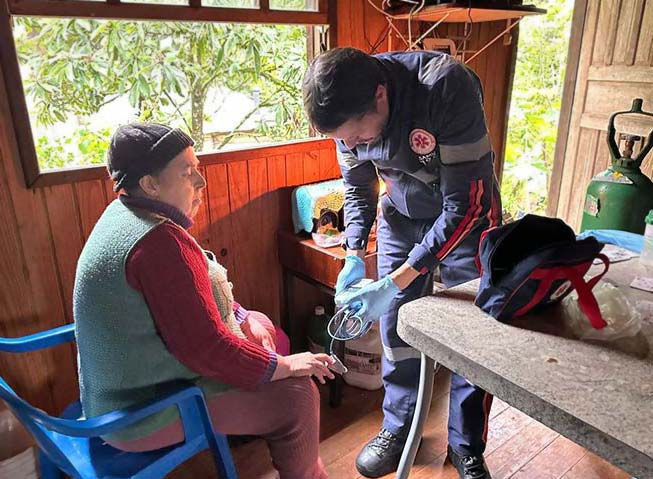In an impressive demonstration of coordination and humanity, Caxias City Hall, in partnership with the Brazilian Army, the Municipal Guard, SAMU, and the Military Brigade, organized an emergency task force on Friday afternoon to rescue families who had been isolated by falling barriers and bridges in the community of São Pedro, located in the interior of Vila Cristina.
The scenario was urgent, with the community facing adverse conditions due to the blockage of main accesses caused by recent landslides. In total, the operation managed to rescue 41 residents, including Maria Fausta de Souza Grams, 62 years old, a woman dependent on oxygen, who was without electricity and in a critical condition in her home. In addition to her, another elderly woman received emergency medical care from SAMU before being rescued from the scene.
Of the rescued individuals, 27 were taken to the SESI gym, a place adapted to temporarily shelter those affected by the situation, while the others found refuge in family homes in the city, demonstrating the solidarity of the local community.
In another location in Vila Cristina, known as Viva Maria, the teams managed to rescue another 35 people, including six children, and up to five dogs, which were also sent to temporary shelters, ensuring the safety of all living beings affected.


Despite the success of the rescue operations, many roads and access points in the interior of Caxias remain blocked, keeping certain areas still isolated. Among the most affected places are close to the Arroio Aliança and Arroio Belo canals, as well as several locations such as Vila Oliva, Santa Lúcia do Piaí and Galópolis, where communities such as Zona Andreis, Grota, Pessegueiro, Bem-te-vi, among others, remain difficult to access.
This situation reinforces the need for constant vigilance and preparation for rapid responses by local and national authorities, especially in the face of climate change that intensifies the risks of natural disasters.
The operation in Vila Cristina serves as a poignant reminder of the vulnerability of many Brazilian communities to natural disasters and the importance of early warning systems and robust infrastructure to mitigate the impacts of these events. As rescue teams continue their efforts to ensure everyone’s safety, the solidarity and resilience of the local community stands out as a beacon of hope in times of crisis.





